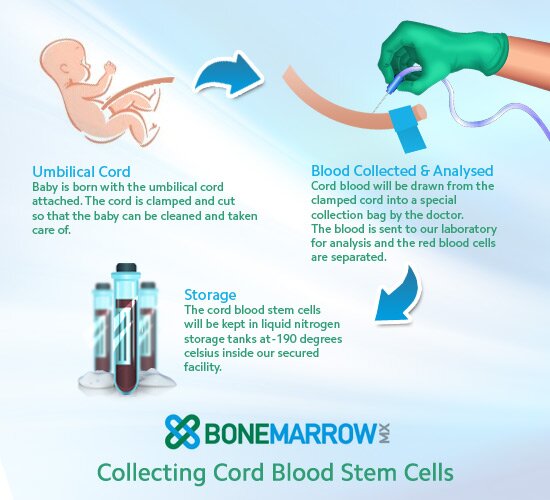
Another Option for Donor Stem Cells
An Umbilical Cord Blood Transplant could be an option for you if you are suffering from failing bone marrow or a bone marrow disorder. This is a relatively new procedure where the blood taken from a baby’s umbilical cord straight after birth is donated, banked and used at a later date for people in need of life-saving stem cells. Although the first cord blood transplant was conducted in 1988, doctors are still learning the benefits and disadvantages on using umbilical cord blood on patients with a bone marrow disease.

Why Do We Use Umbilical Cord Blood Transplants?
Although cord blood contains stem cells just like peripheral blood and bone marrow, all three sources of stem cells differ slightly. There are a range of reasons why your doctor may decide that a cord blood transplant is the best option for you:
- Easier Matching. For the best results after a stem cell transplant, we need to find the closest possible match between the donor or cord blood and the recipient. Whilst a close DNA match between the cord blood and the patient is preferred, studies have shown that the match doesn’t have to be as close with cord blood as it does with peripheral blood or bone marrow transplants. If it proves difficult to find closely matching stem cells, cord blood may be the best option.
- Quickly Available. Because cord blood units are donated, prepared and stored, they are accessible and ready to use. It is possible for a cord blood match to be found and delivered to Hospital Angeles Lomas within two weeks, whereas it can take two months to find a bone marrow or peripheral blood donor that is not related to the patient. If a transplant is urgently required, your doctor may decide that cord blood is the best option for you.
- Lower Risk of Rejection. Graft Versus Host Disease (GVHD) is the most common complication to arise following an allogeneic transplant. This is a condition where the body rejects the new cells and a battle ensues within the blood, with the patient’s cells and the donated cells fighting to survive. GVHD can range in severity but studies found that fewer patients develop the condition after cord blood transplant than after marrow or peripheral blood transplants, and those cord blood patients that did develop GVHD experienced less severe cases.
Your doctor will decide the best kind of transplant for you. If you would like to speak to a medical professional from Hospital Angeles Lomas we will be happy to give you a no-obligation, free consultation with a medical professional from the Bone Marrow Transplant Team.
For your free consultation about a cord blood cell transplant please contact us today.